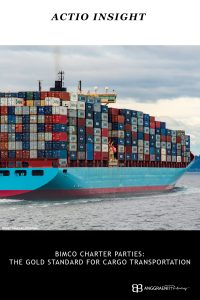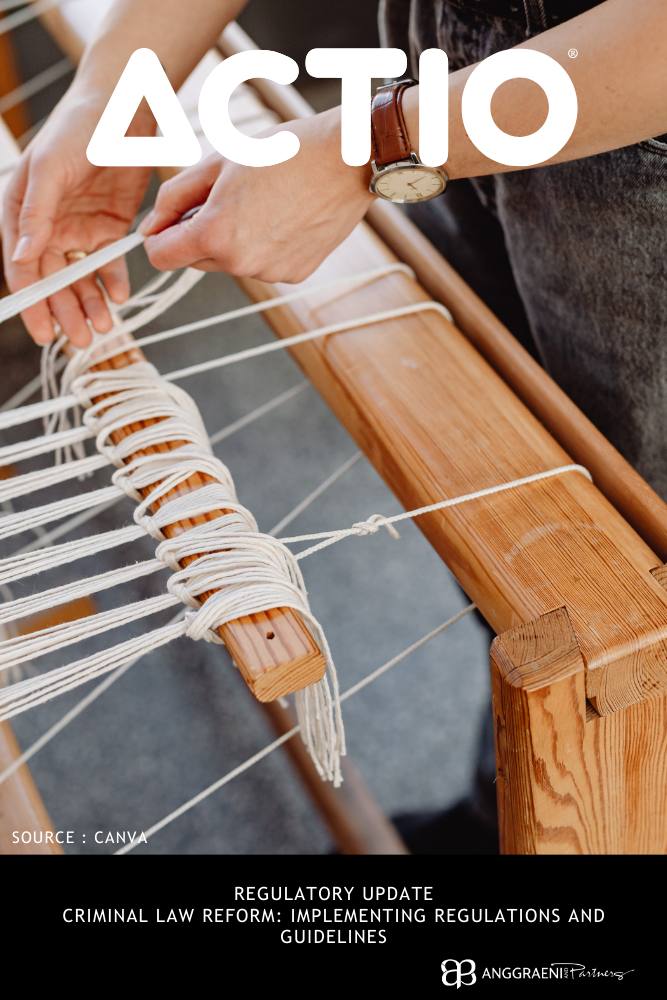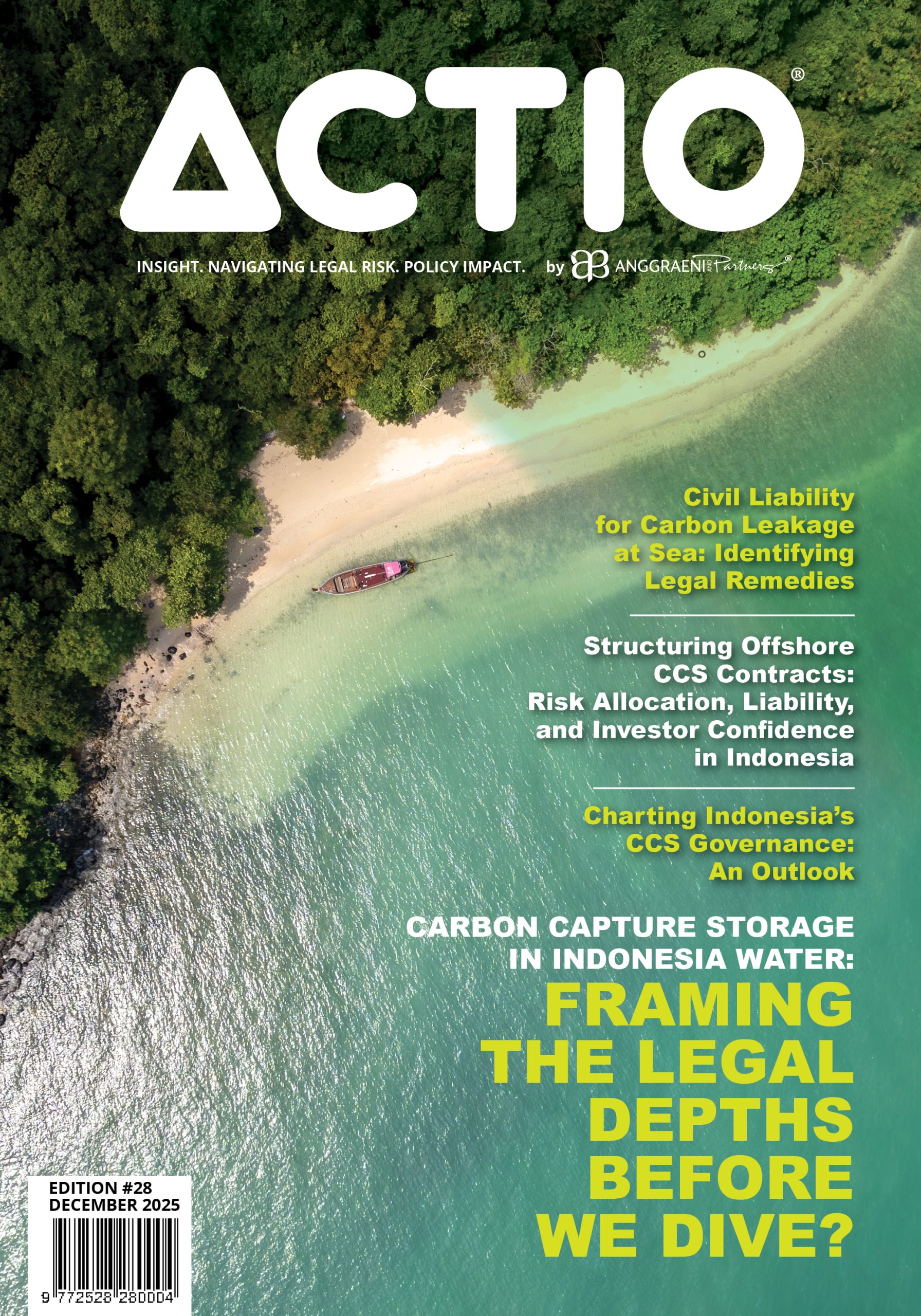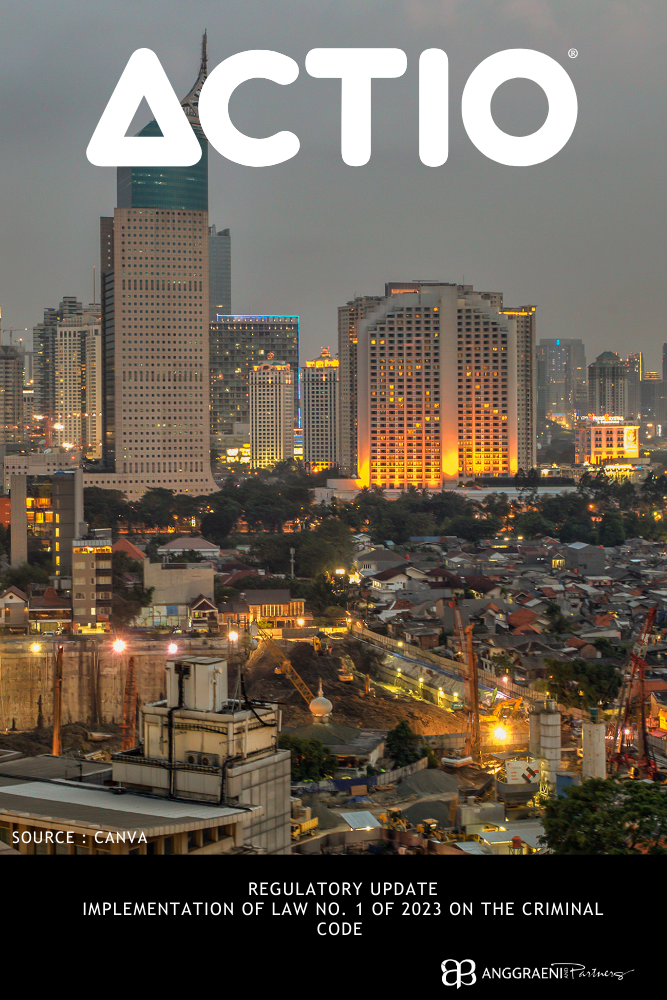- Home
- Capabilities
- ACTIO® Hub
- About Us
- Connect with Us
- AP Library
 Setyawati Fitrianggraeni, Tanya Widjaja Kusumah, Febriana Hapsari, Nazaruddin Insyiroh
Setyawati Fitrianggraeni, Tanya Widjaja Kusumah, Febriana Hapsari, Nazaruddin Insyiroh
INTRODUCTION
Cargo transportation involves the transfer of commodities from one location to another, serving as a vital component of the worldwide economy by enabling businesses to trade and exchange goods and services. Transporting these goods is generally made by air, ground, and sea transport, or a combination of these methods.
All Parties involved in transportation must be clear about their rights, obligations, and responsibilities and these are usually explicitly spelt out in a written contract. Sea transportation uses its own specialised terminlogy but essentially imports contract law principles to determines these rights, obligations and responsibilities. A charter party or charter is defined as a specific contract by which the owner of a ship lets the whole or principal part to another person for the conveyance of goods on a particular voyage to one or more places or until the expiration of a specified time.[1] In accordance with Indonesian law, as stated in Article 453 paragraph (1) of the Indonesian Commercial Law Code (“KUHD”) as follows: “What is interpreted by charter (vervrachten) and chartering (bevrachten) is chartering according to time (time charter) and chartering according to voyage (voyage charter)”.[2]
Based on the provisions in the KUHD, as mentioned before, Indonesia regulates and distinguishes charter parties into two types, although in practice, three main types of charterparties have developed.
Three Types of Charter Party
Charter parties exhibit a substantial degree of standardization and may be categorized into three primary classifications as follows:
In a voyage charter, the ship is hired to carry a full cargo on a single voyage. The ship remains under the owner’s control as to manning and navigation.[3] The definition of voyage charter, according to Article 453 paragraph (3) of the KUHD, is as follows: “A charter by voyage is an agreement by which one party (the owner) binds himself to provide for the use of a designated ship in whole or in part for the other party (the charterer), in order for him to be transported persons or goods by sea on one or more voyages by paying a certain price for this carriage”.[4]
2. Time Charter
A time charter is a charter in which the ship is manned and navigated by the owner, but her capacity is left to the charterer for a specified time. The time charter permits the charterer to have tonnage under his control for a fixed period without undertaking a ship’s owner long-term financial commitments or the ship management and navigation responsibilities.[5] In Indonesia, Article 453 paragraph (2) of the KUHD states as follows: “A charter according to time is an agreement by which one party (the owner) binds himself for a certain time, providing a certain ship, to the opposite party (the charterer) to use the ship on the voyage at sea for the latter party, with payment of a price, calculated according to the length of time”.[6]
3. The Demise or Bare Boat Charter
In this type of charter, the charterer becomes, in effect, the owner pro hac vice by taking over the ship completely – men, victuals, and provisions her – and assumes the responsibility of her navigation and her upkeep. Having complete control, the bareboat charterer also assumes the responsibilities of an owner. An important distinction between the bareboat and the time and voyage charters is that the demise charterer is regarded as the owner pro hac vice and, as such, qualifies as an owner for the benefit of the limitation of liability statutes. In contrast, the time and voyage charterers do not.[7]
Charter parties follow a number of established global standards:
Baltic and International Maritime Council (BIMCO)
BIMCO is the world’s largest shipping organization and global shipping community with 2100 members in over 130 countries.[8] BIMCO members include ship owners, ship operators, managers, brokers, and agencies. BIMCO plays an important role in developing international standards for maritime contracts, including laytime contracts and charter party contracts. The organization produces standard documents used by the entire maritime industry, such as the BIMCO Standard Shipping Contract and the BIMCO Standard Time Charter Party.[9]
BIMCO charter parties are the gold standard for cargo transportation. They are widely used throughout the shipping industry, according to The Maritime Executive, it’s estimated that seventy-five percent of maritime transactions involve the use of BIMCO contracts.[10] This is because they are fair, balanced, and comprehensive. BIMCO charter parties are also regularly updated to reflect changes in the market and in the law. For example, the clause for time charter parties regarding infectious or contagious diseases clause updated to 2022 version to replace the previous (2015) clause to provide the industry with a contractual solution that addresses the practical and commercial realities.[11]
One of the key advantages of BIMCO charter parties is that they are based on the principle of freedom of contract. This means that the parties to a charter party are free to agree on any terms and conditions that they wish, provided that they are not illegal or contrary to public policy. However, BIMCO charter parties provide a valuable starting point for negotiations, as they cover all of the essential elements of a charter party in a clear and concise manner.
Another advantage of BIMCO charter parties is that they are supported by a global network of maritime lawyers and experts. This means that if a dispute arises under a BIMCO charter party, there is a wealth of expertise available to help the parties resolve the dispute quickly and efficiently.
BIMCO offers a wide range of charter parties for different types of cargo and different types of voyages. This includes charter parties for dry bulk cargo, liquid cargo, containerized cargo, and project cargo. BIMCO also offers charter parties for voyage charters, time charters, and bareboat charters.
As a result of their many advantages, BIMCO charter parties are the preferred choice for many shipowners and charterers and become essential for cargo transportation. They provide a fair and balanced basis for the contract between the shipowner and the charterer, allocate risk fairly between the parties, and are widely understood and accepted by the shipping industry. BIMCO charter parties are also supported by a global network of maritime lawyers and experts.
Furthermore, various documents, including contract templates and clauses of agreements related to shipping and maritime affairs, provided by BIMCO can also be utilised by parties in Indonesia. This is because, fundamentally, the form and content of the contract itself adhere to the principle of freedom of contract. As a result, these contracts remain valid and can be submitted in a trial in the event of a dispute between the parties.
The use of BIMCO charter documents in Indonesia has been evident since the collaboration between the Indonesian National Shipowners’ Association (INSA) and BIMCO, aimed at enhancing the capability to establish business relations in the maritime sector. This collaboration was initiated on November 17, 2017. Budhi Halim, Secretary General of INSA, highlighted that BIMCO offers standard business agreements that can be used by shipping companies in cooperation, such as Time Charter Party and Bareboat Contract.[12]
REFERENCES
BIMCO, https://www.bimco.org.
Crunchbase, https://www.crunchbase.com/organization/bimco.
Indonesian Commercial Law Code (KUHD).
Kompas, https://www.kompas.id/baca/ekonomi/2017/11/17/insa-kerja-sama-dengan-bimco.
Roman T. Keenan, Charter Parties and Bills of Lading, 42 Marq. L. Rev. 346 (1959). Available at: https://scholarship.law.marquette.edu/mulr/vol42/iss3/5.
The Maritime Executive, https://maritime-executive.com/magazine/bimco.
[1] Roman T. Keenan, Charter Parties and Bills of Lading, 42 Marq. L. Rev. 346 (1959). Available at: https://scholarship.law.marquette.edu/mulr/vol42/iss3/5.
[2] Article 453 paragraph (1) Indonesian Commercial Law Code (KUHD).
[3] Roman T. Keenan, Op. cit.
[4] Article 453 paragraph (3) Indonesian Commercial Law Code (KUHD).
[5] Roman T. Keenan, Op. cit.
[6] Article 453 paragraph (2) Indonesian Commercial Law Code (KUHD).
[7] Roman T. Keenan, Op. cit.
[8] https://www.crunchbase.com/organization/bimco.
[9] https://www.bimco.org.
[10] https://maritime-executive.com/magazine/bimco
[11] https://www.bimco.org/Contracts-and-clauses/BIMCO- Clauses/Current/Infectious_or_Contagious_Diseases_Clause_for_Time_Charter_Parties_2022
[12] https://www.kompas.id/baca/ekonomi/2017/11/17/insa-kerja-sama-dengan-bimco
DISCLAIMER :
This disclaimer applies to the publication of articles by Anggraeni and Partners. By accessing or reading any articles published by Anggraeni and Partners, you acknowledge and agree to the terms of this disclaimer:
No Legal Advice: The articles published by Anggraeni and Partners are for informational purposes only and do not constitute legal advice. The information provided in the articles is not intended to create an attorney-client relationship between Anggraeni and Partners and the reader. The articles should not be relied upon as a substitute for seeking professional legal advice. For specific legal advice tailored to your individual circumstances, please consult a qualified attorney.
Accuracy and Completeness: Anggraeni and Partners strive to ensure the accuracy and completeness of the information presented in the articles. However, we do not warrant or guarantee the accuracy, currency, or completeness of the information. Laws and legal interpretations may vary, and the information in the articles may not be applicable to your jurisdiction or specific situation. Therefore, Anggraeni and Partners disclaim any liability for any errors or omissions in the articles.
No Endorsement: Any references or mentions of third-party organizations, products, services, or websites in the articles are for informational purposes only and do not constitute an endorsement or recommendation by Anggraeni and Partners. We do not assume responsibility for the accuracy, quality, or reliability of any third-party information or services mentioned in the articles.
No Liability: Anggraeni and Partners, its partners, attorneys, employees, or affiliates shall not be liable for any direct, indirect, incidental, consequential, or special damages arising out of or in connection with the use of the articles or reliance on any information contained therein. This includes but is not limited to, loss of data, loss of profits, or damages resulting from the use or inability to use the articles.
No Attorney-Client Relationship: Reading or accessing the articles does not establish an attorney-client relationship between Anggraeni and Partners and the reader. The information provided in the articles is general in nature and may not be applicable to your specific legal situation. Any communication with Anggraeni and Partners through the articles or any contact form on the website does not create an attorney-client relationship or establish confidentiality.
By accessing or reading the articles, you acknowledge that you have read, understood, and agreed to this disclaimer. If you do not agree with any part of this disclaimer, please refrain from accessing or reading the articles published by Anggraeni and Partners.
For further information, please contact:
P: 6221. 7278 7678, 72795001
H: +62 811 8800 427
Anggraeni and Partners, an Indonesian law practice with a worldwide vision, provides comprehensive legal solutions using forward-thinking strategies. We help clients manage legal risk and resolve disputes on admiralty and maritime law, complicated energy and commercial issues, arbitration and litigation, tortious claims handling, and cyber tech law.
S.F. Anggraeni
Managing Partner
Tanya Widjaja Kusumah
Managing Associate
tanya.kusumah@ap-lawsolution.net
Febriana Dwi Hapsari
License Specialist
febriana@ap-lawsolution.net
Nazaruddin Insyiroh
Trainee Associate
nazaruddin.ih@ap-lawsolution.net


